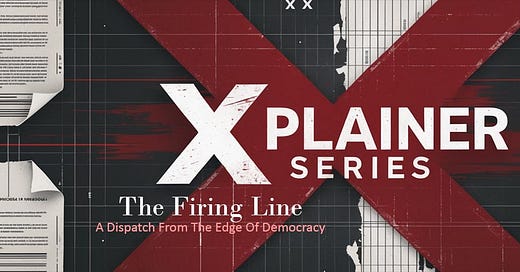Inside Part 1: AI Surveillance and U.S. Government Contracts – What You’re Not Being Told
Secretive Surveillance Tools Used By U.S. Agencies
About This Series
AI Surveillance and the U.S. Government: Contracts, Concerns, and Controversies is a three-part investigative series that pulls back the curtain on the rapidly expanding, and often opaque, world of government surveillance powered by artificial intelligence. Each installment examines how powerful tech firms like Palantir, Clearview AI, Anduril, Amazon, Microsoft, and Booz Allen Hamilton have become embedded in federal operations with little public oversight. The series explores the erosion of civil liberties, exposes conflicts of interest and cronyism in contract awards, and highlights the human cost of flawed systems. Through documented cases and a narrative lens, this series is a call for transparency, accountability, and democratic vigilance in the face of a rising surveillance state.
Introduction
In recent years, the U.S. federal government has leaned heavily on private tech companies to power a new era of surveillance. Firms like Palantir, Clearview AI, Anduril, Amazon Web Services (AWS), Microsoft, and Booz Allen Hamilton have secured lucrative contracts to provide artificial intelligence-driven surveillance tools to agencies ranging from the Department of Defense to local police. These partnerships are transforming how authorities monitor people – often quietly and without robust oversight. Civil liberties advocates warn that this rapid expansion of high-tech surveillance is outpacing the safeguards needed to protect Americans’ privacy, constitutional rights, and due process.

The implications for the public are profound. Facial recognition databases, predictive policing algorithms, and autonomous monitoring towers are being deployed at scale, sometimes in secret. Critics say these tools enable a level of mass surveillance that could erode the foundations of privacy and freedom of association in American life. They point to documented cases of misidentifications and bias in AI systems, raising the specter of wrongful arrests or targeting of innocent people – violations of due process and justice:
In 2020, Robert Williams, a Black man in Michigan, was wrongfully arrested after facial recognition software mistakenly identified him as a suspect. The system misread grainy surveillance footage, and the match led to his arrest in front of his family. He was released only after the error became clear, and his case sparked national outcry.
In a 2018 ACLU test, Amazon’s Rekognition software falsely matched 28 members of Congress to mugshots of criminal suspects, with a disproportionate number of false matches among people of color.
In 2023, the LAPD ended a predictive policing program using Palantir software after it was shown to disproportionately target Black and Latino neighborhoods based on flawed data inputs that perpetuated existing biases.
Moreover, many of these systems operate with scant transparency, leaving Americans in the dark about how their data is collected or used. For instance, the Government Accounting Office (GAO) found that federal agencies using Clearview AI and similar tools often lacked formal policies or records of how these systems were accessed. Citizens are frequently unaware that their images and information, sourced from social media, public records, or surveillance footage, are being pulled into massive datasets and used for law enforcement or immigration enforcement. Requests for information are often denied under vendor secrecy or national security exemptions.
Equally alarming are questions about how these contracts are awarded and whether political connections and private interests are driving decision-making. Several of these companies enjoy cozy relationships with government insiders or powerful figures. Observers have noted patterns of cronyism and conflicts of interest – from former officials on contractor payrolls to allegations of favoritism by those in power. In one extraordinary example, Elon Musk was controversially appointed to lead a federal “cost-cutting” initiative (cheekily nicknamed the Department of Government Efficiency, or DOGE). Musk’s dual role as a government insider and tech CEO has raised red flags that he may be steering government dollars toward his own companies or those of allies. Such claims – including a reported plan to funnel $400 million in contracts to Tesla – underscore the public’s concern that insider influence and graft could be contaminating procurement processes meant to serve taxpayers’ interests.
This report investigates the AI surveillance contracts of these key companies and the major issues at stake. Below, we summarize each company’s role in federal surveillance and its impact on American society, using an accessible, journalistic lens. Following these summaries, an appendix provides a deeper dive into each company’s contracts, the scope of their services, the privacy implications for citizens, and the controversies that have arisen. Throughout, the focus remains on truth, transparency, and accountability – shedding light on what these powerful public-private partnerships mean for civil liberties and how political power may be influencing who profits from the surveillance state.




Anybody feel like rewatching “Minority Report “ after reading this? I mean, for educational purposes.
Makes me sad that so much lying is occurring with the current administration.